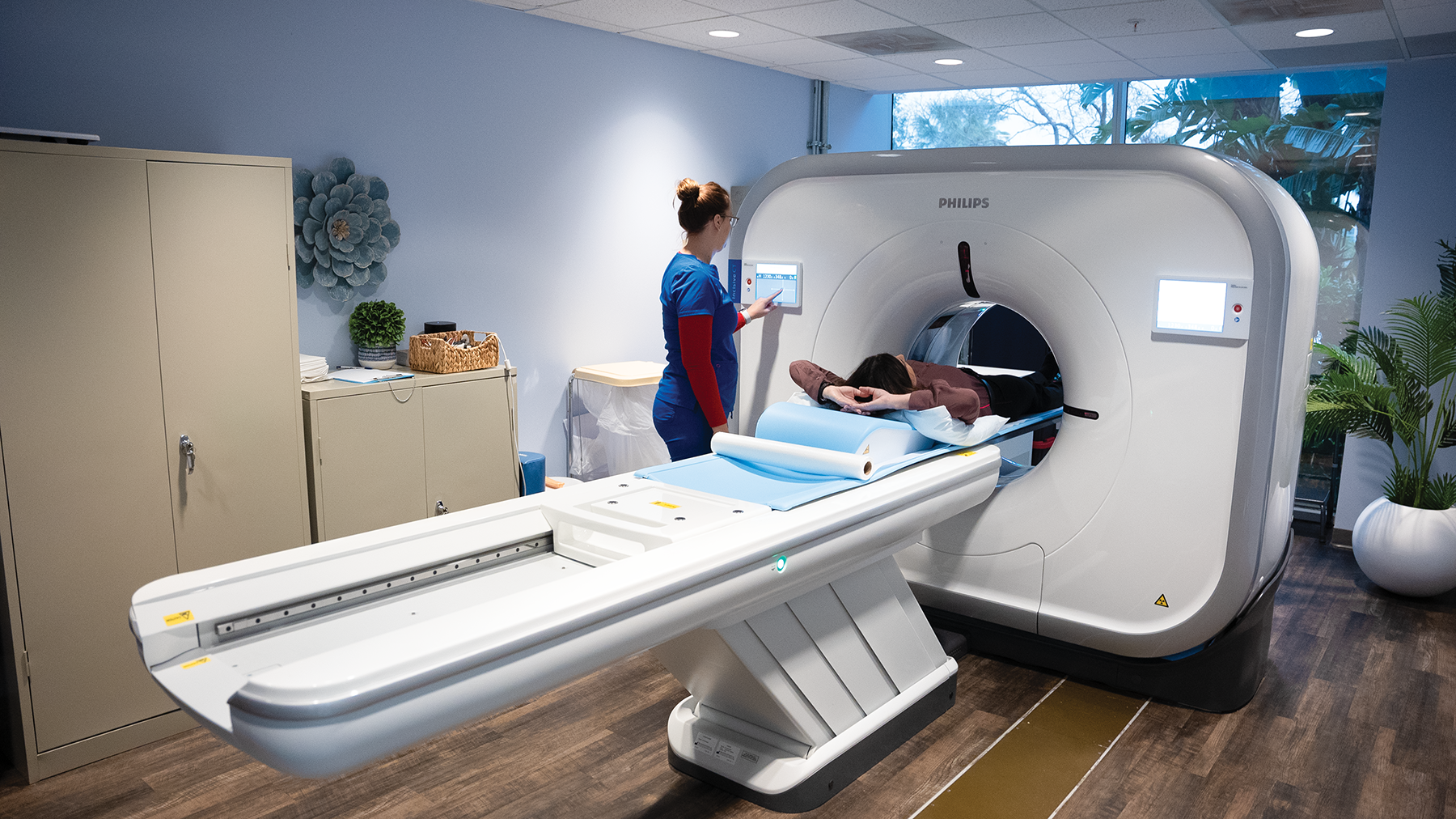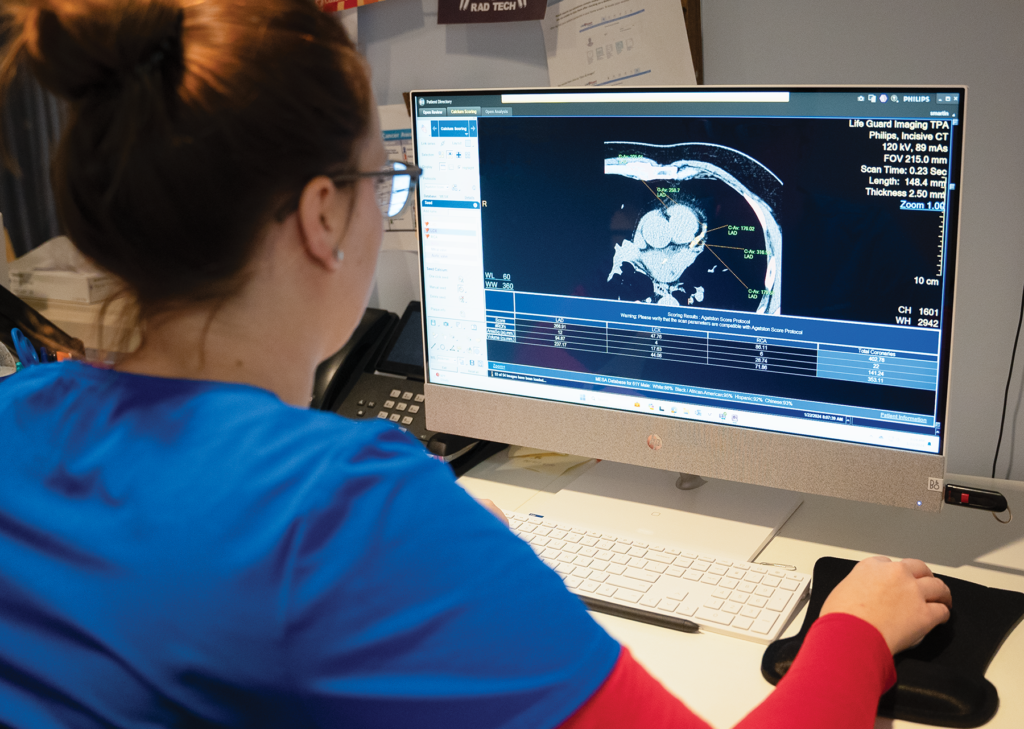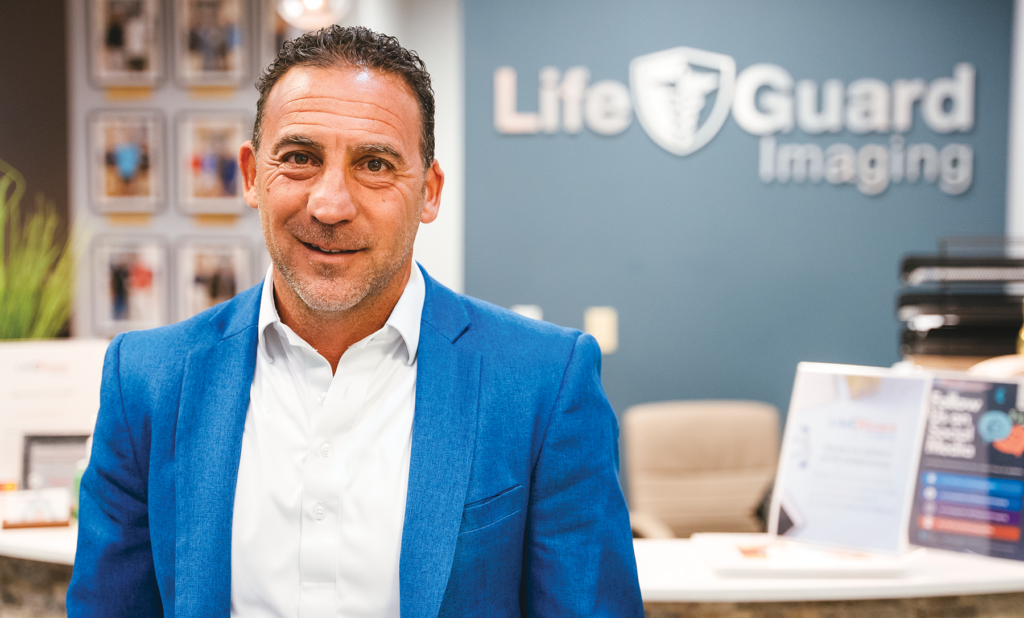
Imagine being a medical professional, feeling a little off and undergoing a hospital CT (computed tomography) scan of your stomach because, with your background, you know when something is wrong in your body. You receive a clean bill of health despite not feeling well, only to receive a diagnosis of pancreatic cancer 10 months later and tragically lose your battle in six short weeks.
Due to gaps in the standard scan you, as a doctor, trusted, it failed to detect cancer on the backside tail of your pancreas, and it went untreated. While healthcare in the US is better than in many places, the downside is that it still is more reactive than proactive.
After losing his father, surgeon Benjamin J. Maldonado, Jr., 25 years ago to this usually deadly form of cancer, Frank Maldonado was inspired to establish Life Guard Imaging with his wife Amy.
The company opened in Tampa on Rocky Point Dr., off the Courtney Campbell Cswy. in Tampa in August 2021 to be easily accessible to the (predominantly) older demographic that has had their medical needs unchecked but who want to be proactive about their health. A second location of Life Guard Imaging opened in October 2023 in Phoenix, AZ, and a third location is coming to Sarasota in the summer.
Unlike traditional scanners, Life Guard Imaging’s low-radiation, high-resolution 3D imaging scanners are programmed with slices that are so thin that they can capture something as small as a 2 mm ball-bearing-sized shadow.
“At that detectable size, we can monitor it to make sure it doesn’t become something dangerous or if it is something dangerous, have it eradicated early enough,” says Maldonado, who is Life Guard Imaging’s director of operations. “With these thin slices, we see things so small that we can often capture them before they become metastatic, hitting the lymph nodes and spreading throughout the body. Our patients are surviving diseases that are taking millions of lives a year. Our motto is saving lives through early detection.”

Life Guard Imaging’s detailed scans reveal insights well beyond what basic bloodwork can show. Much like a mammogram, your first scan acts as a baseline for all future scans. If anything changes, your doctor can plan a course of action. The CT scan radiation dosage is so low that it is safe to do annually or, if necessary, even multiple times a year
“From the shoulders to the base of the pelvis, we are trying to find things at the earliest possible moment,” Maldonado says. “Even a deadly disease like cancer, if it’s found early enough, can be survivable.”
The company’s vision is to bring this technology and capability to as many cities, states and potentially even other countries as possible. Maldonado and his team want to allow people to detect these once-silent killers before the first symptoms are felt.
“Because, generally, that’s when it’s too late,” he explains.
Life Guard Imaging offers a comprehensive scan of your vital organs. Among the services available are:
• Coronary artery calcium scans that can detect and quantify calcium in the arteries of your heart, allowing you to know your risk for blockage and a potentially life-threatening heart attack.
• Lung scans that can visualize nodules as small as 2 mm, detect diseases, particularly lung cancer, early, while it is early and more treatable.
• Comprehensive and gentle colon examinations with Life Guard’s “virtual colonoscopy” scan that does not require any anesthesia, dyes or long probes.
• CT bone density scans that use X-rays via computed tomography to measure how many grams of calcium and other bone minerals are packed into a segment of bone and calculate your risk of breaking a bone. This scan can be added to a lung or full body scan.
• The most comprehensive scan is the full body scan. It can uncover abnormalities and changes that occur in the vital organs of the chest, abdomen, and pelvis.
New Technology
The team is excited about upcoming additions to the facility. Life Guard Imaging just got a new scanner that is significantly faster and allows for half the radiation dose of prior machines.
“We also have ultrasound equipment coming and will be able to do carotid artery screenings,” says director of imaging Stephanie Martin. And, upcoming is totally AI (artificial intelligence) calcium scoring software that’s not out on the market yet, but it’s going to be coming. It’s always good to have an extra set of computer eyes. All scans are performed by registered CT techs and read by Board-certified radiology doctors. We’re really confident about the results that we’re putting out.”
Former Tampa Bay Buccaneers placekicker Martin Gramatica was so impressed by the service he received he became part of the team. Gramatica, who is now Life Guard’s VP of Business Development, says, “We tell our patients we want you to come in before your first symptom. We want people to know they can come in and do a preventive scan. Our goal is to open one to three new locations per year and keep the family atmosphere. Our patients are the priority, from the front desk to the patient advocate to when they get their scans.”

He adds, “When our patients come in, they will meet with a patient advocate who will explain other scans. The patient will be in the scanner for 5-6 minutes. It’s very fast. It’s an 18-inch donut; patients’ heads never go through the donut, so there are no issues with claustrophobia. It will probably take them longer to walk to the scanner than the actual scan.”
Though preventive scans, like those at Life Guard Imaging, are not covered by insurance, the company offers individual scan pricing, a comprehensive, affordable Legacy Imaging program, and also accepts Care Credit.
“Our Legacy Imaging program is a few dollars a day, less than a Starbucks coffee,” Gramatica says. “The first full body scan is the baseline, and everything is compared year to year. If anything changes, we’re going to catch it early. The sooner cancer or heart disease is caught, the higher the percentage of survival, avoiding chemotherapy and radiation, and having a good quality of life. We find many things before they become deadly, and that’s the goal. We’re literally saving one to three lives per day.”
Life Guard Imaging also honors current and veteran military, firefighters and police officers with discounted programs on its diagnostic imaging services.
Maldonado adds, “This technology has existed for over 25 years. Tell me how it’s possible that it is not readily available all around the country, let alone all around the world? Our goal is to help as many people as possible. The fact that people don’t know this is available in the medical world is a tragedy. For every life we save, hundreds of thousands are lost. We’re giving people more time on earth, more memories with their families, and more good to be done in the world. More people need to have access to this.”
Despite being open less than three years, Life Guard Imaging has hundreds of testimonials from people who say their lives were saved with early detection. One of those is Tuyen Tran, who says she only got scanned herself in June 2023 because her husband Vihn went for one. To their surprise, it was Tuyen who ended up being diagnosed with Stage 1B lung cancer, despite having never been a smoker, as well as with fibroid masses in her uterus, all of which have been removed.
“My pulmonologist said that it was very unusual for a lung malignancy to be found so early,” Tuyen says. “He said that most people don’t get checked until they have symptoms, which is usually Stage 3 or 4, or too late to be helped. Instead, now we’re just watching it every six months with my oncologist. I just want everyone to know that it works.”
Vihn adds, “I believe that Life Guard Imaging has, essentially, saved my wife’s life. It was well worth it (the cost). Even if they find nothing, that’s OK, too. It’s good to have that peace of mind.”
Life Guard Imaging is located at 3001 N. Rocky Point Dr., Suite 185. For more information, visit LifeGuardImaging.com, call (813) 524-1010. You will receive a heart scan at no cost if you mention this story. This reporter made an appointment for a scan after conducting this interview.




No comment yet, add your voice below!